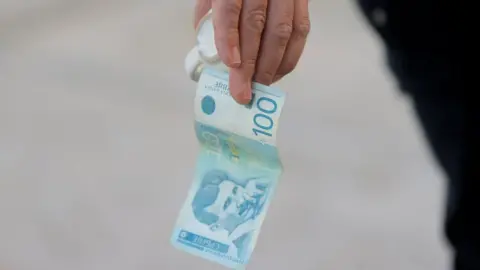Pressure grows on Kosovo Serbs with currency curb
 Reuters
ReutersKosovo's authorities are pressing ahead with a policy that makes the euro the only acceptable currency, even though some areas still use Serbian dinars.
The move has caused concern amongst Kosovo's international partners.
The EU, US and UK are worried it may increase tensions in majority-Serb municipalities.
After coming under pressure, Kosovo's government said it would "not implement punitive measures immediately" if people continued to use the dinar.
But that is not likely to reassure Kosovo Serbs, who have seen a succession of symbols of their identity erased in recent months.
Serbian number plates disappeared at the start of the year, and Kosovo authorities have been removing Serbian flags and signs from public buildings in majority-Serb areas.

Kosovo basics

- The Balkan territory unilaterally declared independence from Serbia in February 2008, after years of strained relations between its ethnic Albanian majority and ethnic Serb minority.
- It had broken away in 1999 after a bloody war of independence which ended after Nato bombing and the withdrawal of Serbian security forces.
- The EU and many EU states recognise its independence but Serbia, backed by its powerful ally Russia, still refuses to do so, as do most ethnic Serbs inside Kosovo.
- Security in the region is still underpinned by a Nato-led peacekeeping force, KFOR, and the EU retains a civilian Rule of Law Mission, EULEX, there

The potential impact of the currency policy is obvious in places such as North Mitrovica. The town may be within the borders of the Republic of Kosovo but enter a shop, cafe or restaurant on the north bank of the River Ibar and you will quickly find that prices are set in Serbian dinars.
The dinar's usage reflects the fact that most of the population in Kosovo's four northern municipalities are Serbs. They do not recognise Kosovo's 2008 unilateral declaration of independence from Serbia, and many work in institutions which are still funded by the government in Belgrade.
That means their salaries are paid in dinars. The same applies to pensions and social benefits paid to Serbs living in Kosovo, who are in a majority in a total of 10 municipalities.
They have had little notice of the authorities' plan to ban the use of the dinar. The central bank only made the announcement midway through January, leaving no time to adapt.
The EU says it is "concerned about the consequences that this decision might have on the daily lives of Kosovo Serbs".
It also criticised the "absence of prior consultation" and warns that the euro-only policy could have an "impact on schools and hospitals, given the apparent absence of alternatives at this moment". The US and the UK have voiced similar concerns.
But government in Pristina has shown little inclination to listen to Kosovo's biggest supporters.
In fact, Deputy Prime Minister Besnik Bislimi argues that the new regulations do not amount to a ban on the currency as it was "not allowed in Kosovo even before". Instead, the policy aims to "protect consumers and the payment system in Kosovo", he says.
That argument will not convince Kosovo Serbs or many international observers. The International Crisis Group think tank says the currency ban fits in to a pattern of "sustained pressure" on Kosovo Serbs since Prime Minister Albin Kurti took power in 2021.
It cites "harsh security measures" as well as an embargo on Serbian goods and the eviction of Serbian institutions from northern municipalities.
It estimates that one in 10 Serbs have left Kosovo just in the past year as a result, with as many as a third leaving for good since 2016.
The think tank calls on the EU to encourage Mr Kurti to soften his stance. But with normalisation talks between Belgrade and Pristina completely stalled, Brussels is struggling to assert its influence.
For now, despite the ban, people in North Mitrovica are still using dinars and can even withdraw them from Postal Savings Bank cash machines. But for Kosovo Serbs, the currency situation adds to a growing feeling of precariousness.
